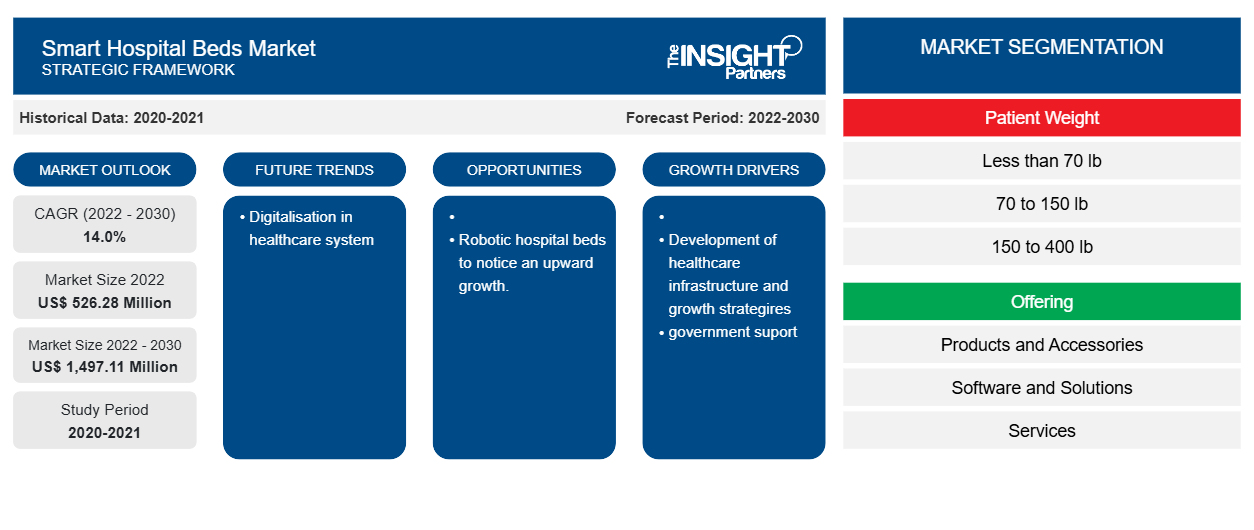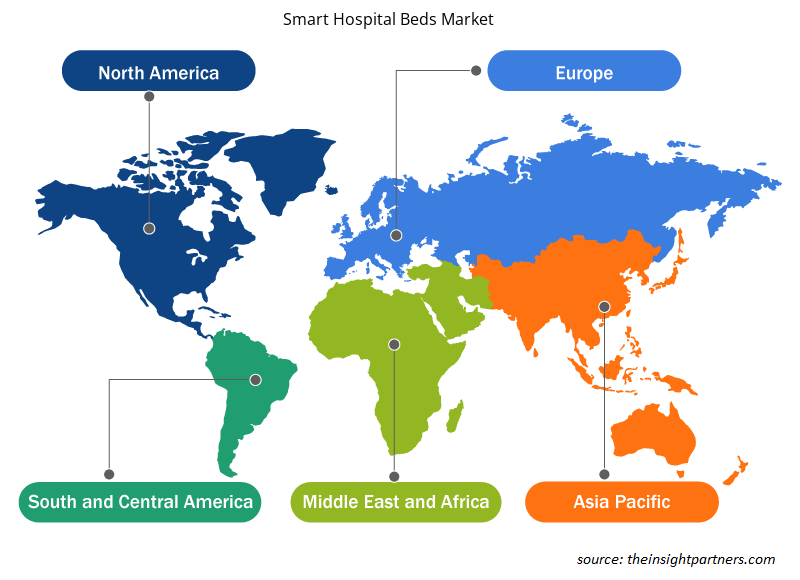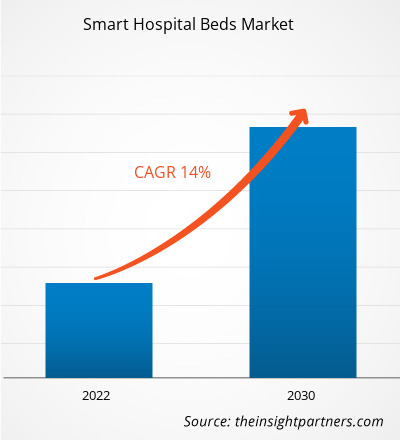The smart hospital beds market size is projected to reach US$ 1,497.11 million by 2030 from US$ 526.28 million in 2022. The market is expected to register a CAGR of 14.0% during 2022–2030. Digitalization in healthcare system is likely to remain key trends in the market.
Smart Hospital Beds Market Analysis
Developments in healthcare infrastructures and growth strategies by smart hospital bed providers acts as a key driver for the smart hospital beds market. The innovations and upgradations attract or encourage healthcare sectors to adopt new technologies. Also, Government is putting strong efforts to enhance healthcare infrastructure worldwide by providing a;ppropiate funds to build hospitals that are equipped with state-of-the-art technologies. In February 2021, Hillrom acquired contact-free continuous monitoring technology from EarlySense at a value of US$ 30 million to strengthen its Centrella Smart+Bed. Centrella Smart+Bed is designed to monitor heart and respiratory rates that are above 100 units per minute. Therefore, development in healthcare infrastructure and growth strategies by smart hospital bed providers are likely to drive market growth.
Smart Hospital Beds Market Overview
Digitalization in healthcare systems acts as a future trend for smart hospital beds market. Advancements in healthcare technologies are expected to secure digital infrastructures by incorporating integrated technologies in healthcare centers and other settings. Digital technologies like telemedicine show opportunities to integrate with smart hospital beds. Therefore, the smart hospital beds with telemedicine features proves effective through remote services offering physicians consultations. Therefore, smart hospital beds are expected to provide similar care in homecare settings and communities through telemedicine enhancing market growth in the coming years.
Customize This Report To Suit Your Requirement
You will get customization on any report - free of charge - including parts of this report, or country-level analysis, Excel Data pack, as well as avail great offers and discounts for start-ups & universities
Smart Hospital Beds Market: Strategic Insights

- Get Top Key Market Trends of this report.This FREE sample will include data analysis, ranging from market trends to estimates and forecasts.
You will get customization on any report - free of charge - including parts of this report, or country-level analysis, Excel Data pack, as well as avail great offers and discounts for start-ups & universities
Smart Hospital Beds Market: Strategic Insights

- Get Top Key Market Trends of this report.This FREE sample will include data analysis, ranging from market trends to estimates and forecasts.
Smart Hospital Beds Market Drivers and Opportunities
Technologically Advanced Smart Beds in Hospitals to Favor Market
Smart beds encompass technologically advanced specifications that enable effective patient services. Also, such smart hospital beds enable faster recovery of patients by making the necessary movements hassle-free as these beds are equipped with monitoring systems that can be used to send alerts notification to nursing department in the hospitals. Communications allow nurses to remotely monitor patient conditions and vital functions. Furthermore, smart beds are now combined with remote sensors, further contributing to better healthcare infrastructures. Therefore, technologically advanced smart beds to serve patients betters is one of the major drivers of global smart hospital beds accounting considerable market share.
Robotic Hospital Beds Will Provide Lucrative Market Opportunity
As per the German Research Center for Artificial Intelligence GmbH (DFKI GmbH), April 2020, press release, the German Federal Ministry for Education and Research (BMBF) announced funding of US$ 1.7 million (1.8 million euros) to develop robotic systems and sensor solutions for hospital beds under the project “AdaMeKoR” with initiation in March 2020. The AdaMeKoR project was launched that aim to meet the burden on staff and medical workers in Germany hospitals through robotic hospital beds. Therefore, robotic hospital beds will provide lucrative market opportunity in improving overall wellbeing of hospital staff thereby dominating market growth.
Smart Hospital Beds Market Report Segmentation Analysis
Key segments that contributed to the derivation of the smart hospital beds market analysis are patient weight, offering, application, and end user.
- Based on patient weight, the smart hospital beds market is segmented as Less than 70 lb, 70 to 150 lb, 150 to 400 lb, 400 to 500 lb, Greater than 500 lb. The Less than 70 lb segment held a larger market share in 2022.
- By offering, the market is segmented into products and accessories, software and solutions, and services. The software and solutions segment held the largest share of the market in 2022.
- By application, the market is segmented into fall prevention, pressure injury prevention, patient deterioration and monitoring, and others. The fall prevention segment held the largest share of the market in 2022.
- By end user, the market is segmented into hospitals, clinics and nursing homes, ambulatory surgical centers, medical laboratories, long term care centers, and others. The hospitals and solutions segment held the largest share of the market in 2022.
Smart Hospital Beds Market Share Analysis by Geography
The geographic scope of the Smart Hospital Beds market report is mainly divided into five regions: North America, Asia Pacific, Europe, Middle East & Africa, and South & Central America.
North America has dominated the market. In North America region, the US accounts largest share for smart hospital beds market. Presence of top manufacturers in the region and their innovative technologically advanced smart beds are the factors contributing to the dominance of the market. Asia Pacific is anticipated to grow with the highest CAGR in the coming years.
Smart Hospital Beds Market Regional Insights
The regional trends and factors influencing the Smart Hospital Beds Market throughout the forecast period have been thoroughly explained by the analysts at Insight Partners. This section also discusses Smart Hospital Beds Market segments and geography across North America, Europe, Asia Pacific, Middle East and Africa, and South and Central America.

- Get the Regional Specific Data for Smart Hospital Beds Market
Smart Hospital Beds Market Report Scope
| Report Attribute | Details |
|---|---|
| Market size in 2022 | US$ 526.28 Million |
| Market Size by 2030 | US$ 1,497.11 Million |
| Global CAGR (2022 - 2030) | 14.0% |
| Historical Data | 2020-2021 |
| Forecast period | 2022-2030 |
| Segments Covered |
By Patient Weight
|
| Regions and Countries Covered | North America
|
| Market leaders and key company profiles |
Smart Hospital Beds Market Players Density: Understanding Its Impact on Business Dynamics
The Smart Hospital Beds Market is growing rapidly, driven by increasing end-user demand due to factors such as evolving consumer preferences, technological advancements, and greater awareness of the product's benefits. As demand rises, businesses are expanding their offerings, innovating to meet consumer needs, and capitalizing on emerging trends, which further fuels market growth.
Market players density refers to the distribution of firms or companies operating within a particular market or industry. It indicates how many competitors (market players) are present in a given market space relative to its size or total market value.
Major Companies operating in the Smart Hospital Beds Market are:
- Hill-Rom HoldingsInc.
- Stryer Corp
- B. Braun SE
- Arjo AB
- Invacare Corp
- Paramount Bed Co.Ltd
Disclaimer: The companies listed above are not ranked in any particular order.

- Get the Smart Hospital Beds Market top key players overview
Smart Hospital Beds Market News and Recent Developments
The Smart hospital beds market is evaluated by gathering qualitative and quantitative data post primary and secondary research, which includes important corporate publications, association data, and databases. A few of the developments in the Smart Hospital Beds market are listed below:
- Wissner-Bosserhoff GmbH company announced launching of a new bed platform “sentida sc and customized concepts”. The launching of new product aims to provide solution-oriented support for maintaining and promoting individual mobility of admitted patients. (Source: Wissner-Bosserhoff GmbH, Company Website/, May 2022)
Smart Hospital Beds Market Report Coverage and Deliverables
The “Smart Hospital Beds Market Size and Forecast (2020–2030)” report provides a detailed analysis of the market covering below areas:
- Smart hospital beds market size and forecast at global, regional, and country levels for all the key market segments covered under the scope
- Smart hospital beds market trends as well as market dynamics such as drivers, restraints, and key opportunities
- Detailed PEST/Porter’s Five Forces and SWOT analysis
- Smart hospital beds market analysis covering key market trends, global and regional framework, major players, regulations, and recent market developments
- Industry landscape and competition analysis covering market concentration, heat map analysis, prominent players, and recent developments for the Smart Hospital Beds market
- Detailed company profiles
Frequently Asked Questions
What would be the estimated value of the smart hospital beds market by 2031?
The estimated value of smart hospital beds market accounted US$ 3.5 billion in 2031.
Which are the leading players operating in the smart hospital beds market?
Hill-Rom Holdings, Inc., Stryer Corp, B. Braun SE, Arjo AB, Invacare Corp, Paramount Bed Co., Ltd., Linet Spl, Malvestio SpA, Stiegelmeyer GmbH & Co. KG, and Baxter are the key players in the smart hospital beds market.
What are the future trends of the smart hospital beds market?
Digitalization in healthcare system to remain as a key trend for smart hospital beds market.
What are the driving factors impacting the smart hospital beds market?
Technologically advanced smart beds in hospitals to favor market is one of the most influential factors responsible for market growth.
Which region dominated the smart hospital beds market in 2023?
North America region dominated the smart hospital beds market in 2023.
What is the expected CAGR of the smart hospital beds market?
The CAGR for smart hospital beds accounted 4.5% during 2023-2031.
- Historical Analysis (2 Years), Base Year, Forecast (7 Years) with CAGR
- PEST and SWOT Analysis
- Market Size Value / Volume - Global, Regional, Country
- Industry and Competitive Landscape
- Excel Dataset
Testimonials
I wish to appreciate your support and the professionalism you displayed in the course of attending to my request for information regarding to infectious disease IVD market in Nigeria. I appreciate your patience, your guidance, and the fact that you were willing to offer a discount, which eventually made it possible for us to close a deal. I look forward to engaging The Insight Partners in the future, all thanks to the impression you have created in me as a result of this first encounter.
DR CHIJIOKE ONYIA, MANAGING DIRECTOR, PineCrest Healthcare Ltd.The Insight Partners delivered insightful, well-structured market research with strong domain expertise. Their team was professional and responsive throughout. The user-friendly website made accessing industry reports seamless. We highly recommend them for reliable, high-quality research services
Yukihiko Adachi CEO, Deep Blue, LLC.Reason to Buy
- Informed Decision-Making
- Understanding Market Dynamics
- Competitive Analysis
- Customer Insights
- Market Forecasts
- Risk Mitigation
- Strategic Planning
- Investment Justification
- Identifying Emerging Markets
- Enhancing Marketing Strategies
- Boosting Operational Efficiency
- Tracking Industry Innovations
- Aligning with Regulatory Trends
Yes! We provide a free sample of the report, which includes Report Scope (Table of Contents), report structure, and selected insights to help you assess the value of the full report. Please click on the "Download Sample" button or contact us to receive your copy.
Absolutely — analyst assistance is part of the package. You can connect with our analyst post-purchase to clarify report insights, methodology or discuss how the findings apply to your business needs.
Once your order is successfully placed, you will receive a confirmation email along with your invoice.
• For published reports: You’ll receive access to the report within 4–6 working hours via a secured email sent to your email.
• For upcoming reports: Your order will be recorded as a pre-booking. Our team will share the estimated release date and keep you informed of any updates. As soon as the report is published, it will be delivered to your registered email.
We offer customization options to align the report with your specific objectives. Whether you need deeper insights into a particular region, industry segment, competitor analysis, or data cut, our research team can tailor the report accordingly. Please share your requirements with us, and we’ll be happy to provide a customized proposal or scope.
The report is available in either PDF format or as an Excel dataset, depending on the license you choose.
The PDF version provides the full analysis and visuals in a ready-to-read format. The Excel dataset includes all underlying data tables for easy manipulation and further analysis.
Please review the license options at checkout or contact us to confirm which formats are included with your purchase.
Our payment process is fully secure and PCI-DSS compliant.
We use trusted and encrypted payment gateways to ensure that all transactions are protected with industry-standard SSL encryption. Your payment details are never stored on our servers and are handled securely by certified third-party processors.
You can make your purchase with confidence, knowing your personal and financial information is safe with us.
Yes, we do offer special pricing for bulk purchases.
If you're interested in purchasing multiple reports, we’re happy to provide a customized bundle offer or volume-based discount tailored to your needs. Please contact our sales team with the list of reports you’re considering, and we’ll share a personalized quote.
Yes, absolutely.
Our team is available to help you make an informed decision. Whether you have questions about the report’s scope, methodology, customization options, or which license suits you best, we’re here to assist. Please reach out to us at sales@theinsightpartners.com, and one of our representatives will get in touch promptly.
Yes, a billing invoice will be automatically generated and sent to your registered email upon successful completion of your purchase.
If you need the invoice in a specific format or require additional details (such as company name, GST, or VAT information), feel free to contact us, and we’ll be happy to assist.
Yes, certainly.
If you encounter any difficulties accessing or receiving your report, our support team is ready to assist you. Simply reach out to us via email or live chat with your order information, and we’ll ensure the issue is resolved quickly so you can access your report without interruption.





















 Get Free Sample For
Get Free Sample For